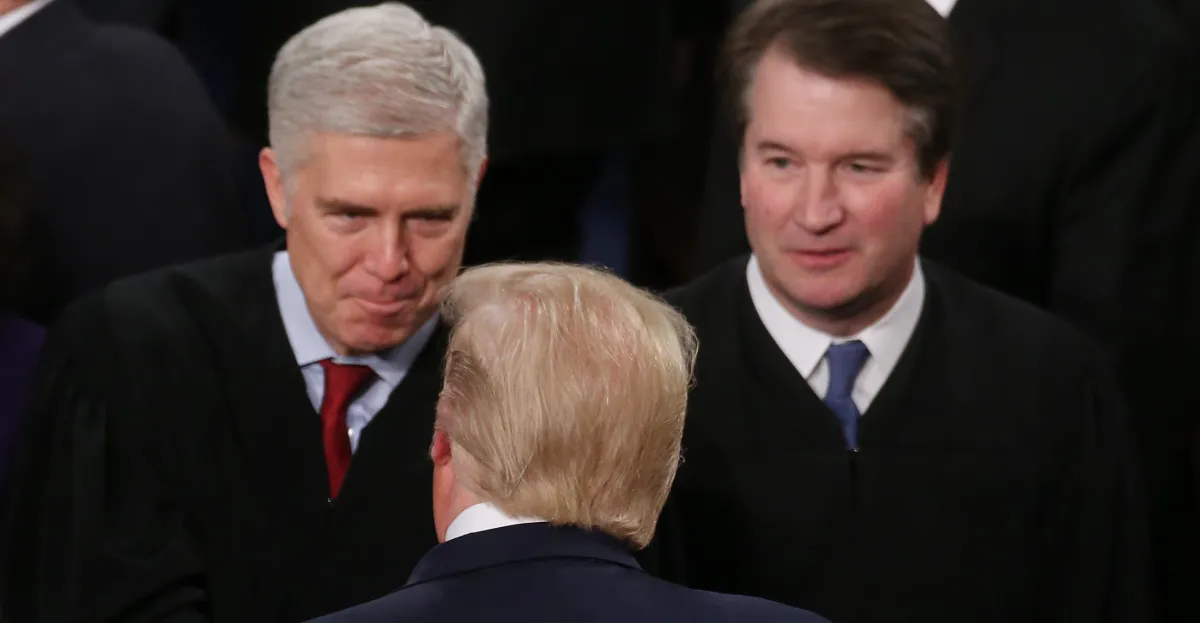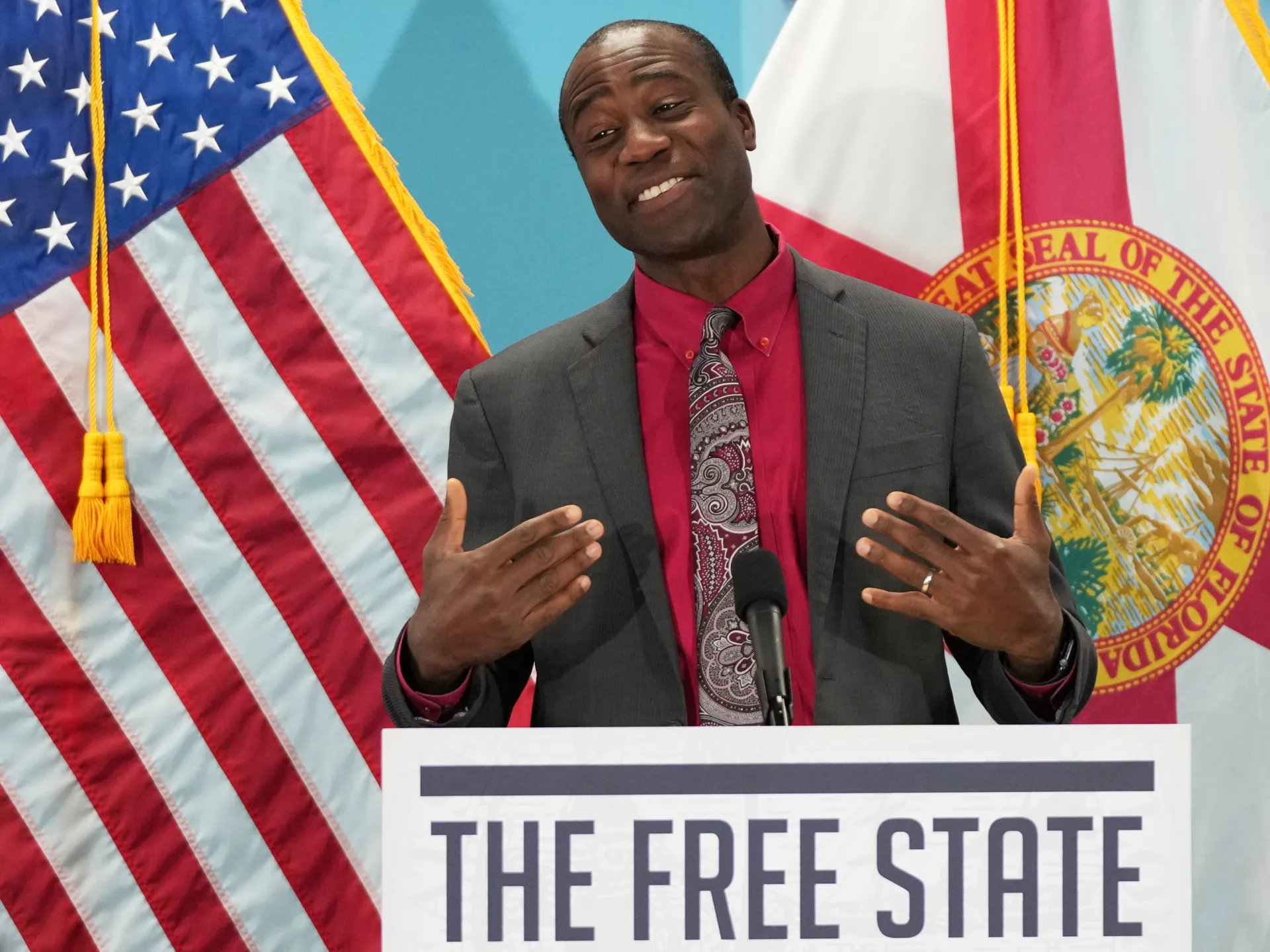Copyright Vox.com

As recently as one year ago, the Supreme Court’s Republican majority was determined to reduce executive power. Joe Biden, a Democrat, was in the White House, and the Republican justices were very concerned that the executive branch was claiming “highly consequential power beyond what Congress could reasonably be understood to have granted.” To keep the executive in check, the Republican justices invented a legal doctrine, known as “major questions,” which was supposed to prevent the president or his subordinates from enacting new policies with “vast ‘economic and political significance’” — at least without getting very specific authorization from Congress first. SCOTUS, Explained Get the latest developments on the US Supreme Court from senior correspondent Ian Millhiser. Email (required) By submitting your email, you agree to our Terms and Privacy Notice. This site is protected by reCAPTCHA and the Google Privacy Policy and Terms of Service apply. Flash forward to the present, and these same Republicans are about to reveal whether this major questions doctrine was an honest effort to allocate power among the three branches of US government, or whether it was simply something they made up to stymie a Democratic president from enacting his agenda. On November 5, the Supreme Court will hear oral arguments in two cases — Learning Resources v. Trump and Trump v. V.O.S. Selections — both of which challenge the ever-shifting tariffs that Trump has imposed on US imports. In both cases, the challengers argue that various provisions of the International Emergency Economic Powers Act of 1977 (IEEPA), the law Trump relied upon when he instituted his tariffs, do not actually permit those tariffs to exist. Several of these statutory arguments, as numerous federal judges have now concluded, are quite strong. But it’s the Republican justices’ major questions doctrine that should remove any doubt that Trump’s tariffs are illegal. According to the center-right Tax Foundation, Trump’s tariffs “are the largest US tax increase as a percent of GDP (0.55 percent for 2025) since 1993.” The Tax Foundation estimates that they will “raise $2.9 trillion in revenue over the next decade on a conventional basis and reduce US GDP by 0.7 percent” — and that’s not counting the money Americans are losing because other countries respond to US tariffs by imposing similar trade barriers on the United States. The tariffs, in other words, are clearly a matter of “vast economic and political significance.” Trump’s tariffs also appear to divide more traditional, fiscally conservative Republicans from the president’s MAGA loyalists. One of the primary lawyers challenging the tariffs is Michael McConnell, a former George W. Bush appointee to a federal appellate court. At a Federalist Society conference on executive power last spring, numerous speakers criticized the tariffs and questioned their legality. One of many Republicans who joined briefs opposing the tariffs is former Sen. John Danforth (R-MO), an early mentor to Justice Clarence Thomas. The major questions doctrine itself is the culmination of a decade-long project by many Republican lawyers and judges to limit executive power. Beginning in the Obama administration, the Federalist Society’s annual lawyers conference became a showcase of various proposals to limit the president’s power to make policy changes without seeking new legislation from Congress — even when an existing statute seemed to authorize the president’s action. Admittedly, many of the same Republican judges and advocates also embraced other legal theories seeking to expand presidential authority — the most notable is the unitary executive theory, which Trump has wielded aggressively to take control of federal agencies that are supposed to have a degree of independence from the president. But this effort to centralize control over federal agencies in the White House happened in parallel with a broader effort to diminish the executive’s power to set policy, V.O.S. Selections and its sister case, in other words, are a loyalty test for the Republican justices. If those justices hew to the legal views they expressed during the Biden administration, or if they remain aligned with the Republican Party’s traditional approach to economic policy, then they must strike down the tariffs. Similarly, if they want to demonstrate their loyalty to the current leader of their political party, the Republican justices will need to write an opinion that simply cannot be squared with their Biden-era decisions. The actual legal questions before the Supreme Court The IEEPA permits the president to “regulate…transactions involving, any property in which any foreign country or a national thereof has any interest.” By law, however, the president may only use this power to “deal with an unusual and extraordinary threat.” The various plaintiffs challenging these tariffs make several arguments that this statutory language does not permit Trump to impose his tariffs. First, they claim that the power to “regulate” imports does not include the power to tax them, pointing to a famous 1824 Supreme Court decision that said “the power to regulate commerce” is “entirely distinct from the right to levy taxes and imposts.” Second, the plaintiffs argue that Trump has not identified an “unusual and extraordinary threat” that can justify his tariffs. Trump claims that most of his tariffs are needed to address the US trade deficit: the fact that the United States buys more goods from foreign nations than it sells. But the United States has had a trade deficit since the mid-1970s, and Trump’s own executive order announcing many of his tariffs concedes that they are “persistent” and “a feature of the global trading system.” So it’s tough to see how trade deficits qualify as unusual or extraordinary. Additionally, the plaintiffs point out that there is a separate federal law governing when the president may impose tariffs to deal with trade deficits. This law only permits tariffs of up to 15 percent, and it stipulates that they must expire after 150 days. This limited grant of authority, they argue, displaces any power to impose tariffs targeting trade deficits that the president would otherwise have under IEEPA. Trump’s lawyers, for what it is worth, have plausible rebuttals to at least some of these arguments. They note, for example, that when Congress enacted IEEPA, the only federal appellate decision concerning whether the word “regulate” includes the power to impose tariffs concluded that it does. Courts sometimes presume that, when Congress uses a word that has an established legal meaning, it wants that word to keep that same meaning. But any uncertainty about how to read IEEPA should be resolved by the major questions doctrine, which says that courts should avoid reading federal laws to give the executive powers of “vast ‘economic and political significance’” if at all possible. The major questions doctrine is very new, and has only ever been used against one president: Biden. But in 2014, the Republican justices did apply an early version of it to a hypothetical EPA regulation, in Utility Air Regulatory Group v. EPA. That case also provides a pithy, one-sentence summary of this brand new legal doctrine: “We expect Congress to speak clearly if it wishes to assign to an agency decisions of vast ‘economic and political significance.’” Under Biden, however, the doctrine grew in scope. In Biden v. Nebraska (2023), for example, the Republican justices struck down a student loan forgiveness plan that was clearly authorized by an act of Congress. The Heroes Act, the law at issue in Nebraska, gave the education secretary broad authority to “waive or modify” student loan obligations during a national emergency such as the Covid-19 pandemic “as the Secretary deems necessary.” Indeed, the Heroes Act permitted the education secretary to act “notwithstanding any other provision of law, unless enacted with specific reference to” that Act. So it is hard to see how Congress could have been clearer that it intended to give the secretary — not the Supreme Court — the final word on student loans. Nevertheless, the Republican justices deemed the Biden administration’s student loans plan — which they estimated would cost “between $469 billion and $519 billion” — to be too ambitious to exist. The “economic and political significance” of such a plan, they concluded, “is staggering by any measure.” But if the rule is that a presidential administration may not create a new policy that involves hundreds of billions of dollars, then Trump’s tariffs obviously must fall. Trump’s own lawyers claim that his new import taxes will “reduce federal deficits by $4 trillion in the coming years.” More reliable sources, like the Budget Lab at Yale, estimate that Trump’s import taxes will “raise about $2.5 trillion over 2026-35.” That’s five times the amount of money at stake in Nebraska. To this, Trump’s lawyers respond that the Supreme Court should simply create some new exceptions to their brand-new major questions doctrine, to make sure that the doctrine doesn’t apply to Trump. They argue, for example, that the doctrine should not apply to policies that are enacted by an order from the president himself, rather than a Cabinet secretary or some other official that works for the president. They also claim, quoting from an opinion by Justice Brett Kavanaugh, that “the major questions canon has not been applied by this Court in the national security or foreign policy contexts.” It’s hard to rebut these arguments, because the major questions doctrine is not law — or, at least, it is not law in the sense that it derives from any particular statute or constitutional provision. It’s merely something the Republican justices made up. So there’s no legal provision that anyone can read to determine how the major questions doctrine should apply in, say, the national security context. As Thomas wrote in a recent concurring opinion, “judge-made doctrines can be difficult for courts to apply,” because those courts “lack an underlying legal authority on which to ground their analysis.” These doctrines often lead to what Justice Ketanji Brown Jackson called “Calvinball jurisprudence,” where the rules change based on the justices’ personal preferences or some other extra-legal factor. In any event, if it was legitimate for the Republican justices to make up a brand new legal rule that they could use to sabotage Biden, then it must be equally legitimate for those same justices to make up arbitrary limits on their new rule, limits that conveniently allow a Republican president to do whatever he wants. But if that happens, there would be little doubt that the Court is placing partisanship ahead of the law. One of the cardinal principles of any system rooted in the rule of law — a principle that stretches all the way back to Aristotle — is that similar cases should be treated similarly. The president’s powers cannot change simply because a different political party controls the White House.



